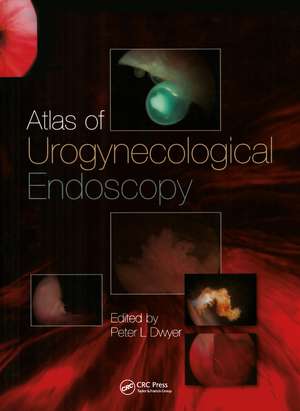Atlas of Urogynecological Endoscopy
Autor Peter L. Dwyeren Limba Engleză Hardback – 26 dec 2007
However, gynecologists have little training or expertise in the use of cystourethroscopy and therefore often do not feel comfortable in performing this procedure or distinguishing what is normal from what is abnormal. An excellent guide for educating gynecologists in endoscopy of the urinary tract, this highly illustrated text addresses this need and provides readers with a full understanding of the equipment that is used, how it is used and the conditions of the lower urinary tract they may find in the treatment of pelvic disorders.
Preț: 1103.26 lei
Preț vechi: 1335.81 lei
-17% Nou
Puncte Express: 1655
Preț estimativ în valută:
211.12€ • 225.75$ • 176.02£
211.12€ • 225.75$ • 176.02£
Comandă specială
Livrare economică 27 martie-10 aprilie
Doresc să fiu notificat când acest titlu va fi disponibil:
Se trimite...
Preluare comenzi: 021 569.72.76
Specificații
ISBN-13: 9781841845401
ISBN-10: 184184540X
Pagini: 200
Ilustrații: 13 b/w images, 315 color images, 13 halftones and 315 color halftones
Dimensiuni: 210 x 280 x 18 mm
Greutate: 1.11 kg
Ediția:1
Editura: CRC Press
Colecția CRC Press
ISBN-10: 184184540X
Pagini: 200
Ilustrații: 13 b/w images, 315 color images, 13 halftones and 315 color halftones
Dimensiuni: 210 x 280 x 18 mm
Greutate: 1.11 kg
Ediția:1
Editura: CRC Press
Colecția CRC Press
Public țintă
Professional ReferenceCuprins
1. History of endoscopy of the female urinary tract. 2. Functional anatomy of the
lower urinary tract. 3. Cystourethroscopic instrumentation and equipment. 4. Cystourethroscopy: technique, indications, and complications. 5. Congenital urinary tract anomalies. 6. Urethral and periurethral conditions. 7. Infective and non-infective cystitis. 8. Interstitial cystitis/painful bladder syndrome/bladder pain syndrome. 9. Non-neoplastic abnormalities of the bladder. 10. Malignant conditions of the bladder and urethra. 11. Laparoscopy in urogynecology. 12. Urogenital fistulae. 13. Role of cystourethroscopy in urogynecological surgery. 14. Intraoperative cystourethroscopy in the prevention and treatment of urinary tract injury in gynecological surgery. 15. Training requirements for endoscopy of the urinary tract in female pelvic medicine.
lower urinary tract. 3. Cystourethroscopic instrumentation and equipment. 4. Cystourethroscopy: technique, indications, and complications. 5. Congenital urinary tract anomalies. 6. Urethral and periurethral conditions. 7. Infective and non-infective cystitis. 8. Interstitial cystitis/painful bladder syndrome/bladder pain syndrome. 9. Non-neoplastic abnormalities of the bladder. 10. Malignant conditions of the bladder and urethra. 11. Laparoscopy in urogynecology. 12. Urogenital fistulae. 13. Role of cystourethroscopy in urogynecological surgery. 14. Intraoperative cystourethroscopy in the prevention and treatment of urinary tract injury in gynecological surgery. 15. Training requirements for endoscopy of the urinary tract in female pelvic medicine.
Recenzii
“An ideal guide for education in endoscopy of the urinary tract in the field of gynaecology and pelvic floor disorders. The clearly and concisely written text provides readers with a comprehensive understanding of the equipment used, how it should be used and the lower urinary tract conditions they may encounter in the treatment of pelvic disorders.”
Jane Meijlink, ICS News
Jane Meijlink, ICS News
Descriere
The study of gynecology and pelvic floor disorders is a rapidly developing area for gynecologists around the world, and, moreover, an essential aspect to the diagnosis and treatment of pelvic floor disorders is a need for expertise in cystourethroscopy to accurately diagnose conditions of the lower urinary tract that frequently present to the gynecologists.
However, gynecologists have little training or expertise in the use of cystourethroscopy and therefore often do not feel comfortable in performing this procedure or distinguishing what is normal from what is abnormal. An excellent guide for educating gynecologists in endoscopy of the urinary tract, this highly illustrated text addresses this need and provides readers with a full understanding of the equipment that is used, how it is used, and the conditions of the lower urinary tract they may find in the treatment of pelvic disorders.
However, gynecologists have little training or expertise in the use of cystourethroscopy and therefore often do not feel comfortable in performing this procedure or distinguishing what is normal from what is abnormal. An excellent guide for educating gynecologists in endoscopy of the urinary tract, this highly illustrated text addresses this need and provides readers with a full understanding of the equipment that is used, how it is used, and the conditions of the lower urinary tract they may find in the treatment of pelvic disorders.
